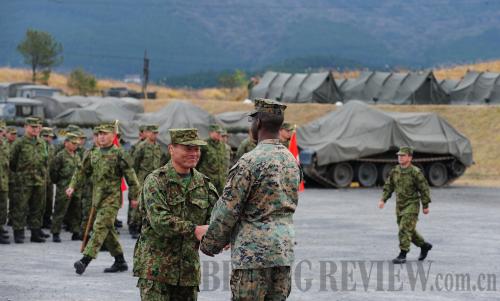|
 |
|
MILITARY MIGHT: Japanese and U.S. soldiers participate in the opening ceremony of a major ground training exercise in southern Japan's Miyazaki Prefecture on December 7, as part of the largest Japan-U.S. joint military exercise in history (JI CHUNPENG) |
The U.S.-Japan-South Korea military alliance has reached a level not seen since the Cold War, said Tao Wenzhao, a professor at the Center for U.S.-China Relations at Tsinghua University in Beijing.
He said the key reason for this is the continual escalation of tensions on the Korean Peninsula.
In reality, though, a U.S.-Japan-South Korea military alliance is not a new development. Since the end of World War II, the United States has maintained a military presence in the Asia-Pacific region by sending troops, signing defense agreements and establishing military alliances.
Although the U.S.-Japan and U.S.-South Korea military alliances are both close, the three countries seldom conduct activities together, other than discussing the North Korean nuclear issue.
Every year, the United States holds large-scale military exercises. But the three countries never before staged meaningful joint military exercises. Apparently, this all changed in 2010.
A collective solution
The continual escalation of tensions on the Korean Peninsula has drawn a flood of international attention. Possible solutions have been a hot topic.
"The United States believed it could frighten North Korea with large-scale military exercises and the most advanced aircraft, as well as other weapons," said Shi from Fudan University. "But the reality proves this is useless."
He said that, as a world superpower, the United States has always taken a tough stance on the North Korean nuclear issue and hoped to force North Korea to change its policies through military deterrence and sanctions.
Shi said that while no immediate results would be produced, tensions could be eased through negotiation.
The Chinese Government has made efforts in this direction. China has proposed emergency consultations among the heads of delegations to the six-party talks.
On November 28, Wu Dawei, Special Representative of the Chinese Government on Korean Peninsula Affairs, announced this proposal at a press conference. However, the diplomatic effort did not get positive responses from the United States, Japan and South Korea.
A week later, on December 6, in a telephone conversation with his U.S. counterpart, Barack Obama, Chinese President Hu Jintao called for a calm and rational response from all sides to prevent the deterioration of the fragile security situation on the Korean Peninsula.
"China has always believed that dialogues and negotiations are the only right way to solve the issues and achieve lasting peace and stability for the Korean Peninsula," Hu said.
He also warned that the fragile security situation on the Korean Peninsula, if not properly handled, could lead to further escalation of tensions, or even get out of control. This is not in the common interests of any concerned parties.
Obama responded that the United States is willing to cooperate closely with China to achieve denuclearization on the peninsula, remove the risk of instability there and protect the security environment in northeast Asia.
On December 8, however, the United States and South Korea announced plans to continue joint military exercises.
The attitudes of the United States, Japan and South Korea may be rooted in misunderstanding, said Piao Jianyi, a Korean Peninsula affairs expert from the Institute of Asia-Pacific Studies at the Chinese Academy of Social Sciences.
He suggested the world should address North Korea's need to peacefully develop nuclear energy. China is concerned with the chain reaction that may result if North Korea develops nuclear weapons. Therefore, it expects denuclearization not only in North Korea but on the whole Korean Peninsula. To achieve this, the six-party talks provide a viable option.
Chen Qi, an expert on East Asian studies at Tsinghua University, also said negotiations are the only solution to the tensions. Changes in South Korea's policies toward North Korea initially caused the tensions. Only after the shift came the March sinking of the South Korean warship, Cheonan, and the recent artillery exchange on the Yeonpyeong Island, he said.
He said the key to the North Korean nuclear issue is to address North Korea's security concerns. External sanctions led to feelings of insecurity in North Korea. The country is seeking nuclear weapons as a means to defend itself.
Chinese experts agree that peace on the Korean Peninsula is in the interest of many countries. Therefore, the solution to tensions on the peninsula will require joint efforts. Most importantly, both North Korea and South Korea must wish for reconciliation. | 